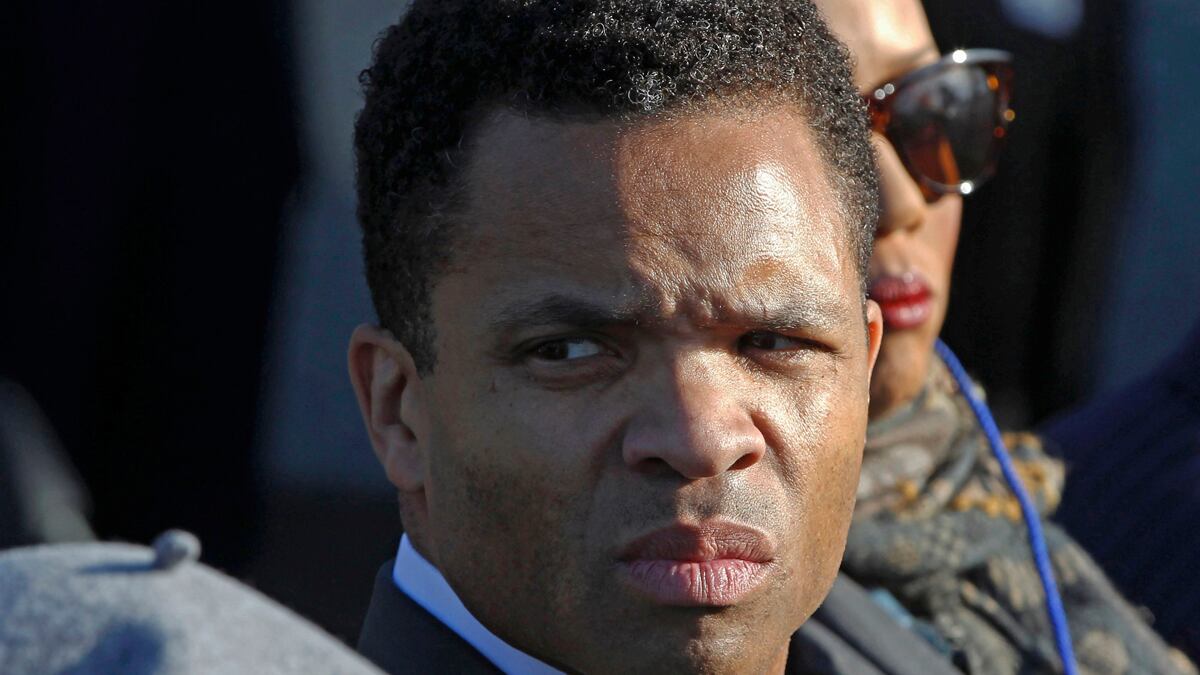As many wait to see whether Jesse Jackson Jr. will agree to a plea deal in the investigation of allegations that he misused campaign funds—and as Jackson himself reportedly awaits news on whether he’ll get disability pay if he indeed does resign—an even larger question looms for the voters of Jackson’s 2nd congressional district in Illinois.

Where do they go from here? Jackson was elected to his 10th term in Congress last week, even as he struggled with health issues and an ongoing ethics investigation. Though he didn’t campaign for reelection as he was receiving treatment at the Mayo Clinic for bipolar disorder and depression, his loyal base of supporters voted the embattled congressman back into office again with seemingly little reservation.
“I like him, that’s why I voted for him again,” says Delores Washington, who lives in Jackson’s district in Chicago. “We all have issues and we all have to fight some demons in our life one way or another. Who am I to judge?”
Apparently that was the prevailing sentiment among many African Americans as they cast their votes on Nov. 6. Washington and others say that the son of civil-rights icon Jesse Jackson Sr. served them well over his many years in Congress, and for that they owe him a great debt.
But at what cost, ask some? Quietly, other African Americans in Jackson’s district are questioning the wisdom of voting for someone so deeply embroiled in the unknown. They say they sympathize with Jackson’s plight and question the validity of the allegations against him, but they are concerned that he isn’t able to lead anyone anywhere at this point.
“We are a loyal people, that’s for sure,” says 51-year Moses Davis, a native of Chicago. “Almost to a fault. We know the history of mistreatment in this country when it comes to African Americans, and that sometimes overshadows us really looking to see the truth in what’s going on.”
Just this summer, Jackson took a leave of absence for exhaustion, and it was later revealed that he’d been suffering from bipolar disorder for years. Sources say months before he took the leave, Jackson also met with federal agents in hopes of working out a plea deal on allegations that he used $20,000 in campaign funds to redecorate his home in Chicago. That home is currently on sale for $2.5 million. Jackson is also being questioned as to how he obtained the $40,000 he allegedly used to buy a female friend a Rolex watch. Jackson could face jail time, depending on terms of the plea deal.
“I don’t know whether that’s true about Jesse Jr. or not. Who knows?” says Davis. “But that and his health were enough to make me reconsider voting for him. It’s good to be loyal to one another, but you have to be thoughtful about it. You have to look at the long-term consequences.”
One consequence if Jackson does resign from his seat is that a special election must be held to replace him. That process could potentially cost taxpayers thousands upon thousands of dollars.
Over the years, African Americans have made a point of supporting those from the community they feel have been unfairly targeted due to a racist system frequently inclined to prosecute African-American males. From disbelief in the guilt of fighter Mike Tyson for rape in the 90s, to questioning the drug sting that brought down former D.C. Mayor Marion Barry in late 80s, African Americans have long doubted the means and the ends of investigations and arrests of well-known black men.
Charles Rangel, a longtime member of the House of Representatives, was soundly reelected by his heavily African-American community as he faced several years of allegations of failure to comply with tax laws, among other violations.
“People look at Jesse Jr. and see his father and all those black men that have fought and struggled for their rights and never got their due,” says a friend close to Jackson Jr. “They see all the black men who’ve been wrongly accused before and so they either don’t believe they’ve done anything wrong or they forgive them easily. If you’re on the outside looking in, it doesn’t make perfect sense, but if you look at the history of African Americans, it does.”
One member of the Congressional Black Caucus says Jackson’s reelection and support shouldn’t be a surprise to anyone, given that many other elected officials of all races and backgrounds have faced similar circumstances and survived with their political careers intact.
‘’Look at someone like Patrick Kennedy and the various issues he faced,” says the member. “Kennedy received the support of his base for years. He left office on his own accord.” Kennedy, who entered the Mayo Clinic several times seeking treatment for drug addiction and bipolar disorder, didn’t run for reelection in 2010. Kennedy was also arrested for driving under the influence while serving his term in 2006. He made a deal with prosecutors and pled guilty to a charge of driving under the influence of prescription drugs. He was sentenced to a one-year probation.
Jackson could face actual jail time depending on the outcome of the plea deal. Sources close to Jackson’s camp say that a plea deal seems inevitable at this point, but a jail term is something they don’t believe Jackson can survive.
“He’s so weak already,” says a close Jackson family friend. “He essentially thinks his life is over and jail would destroy him. The support from his community has been his one saving grace.”






